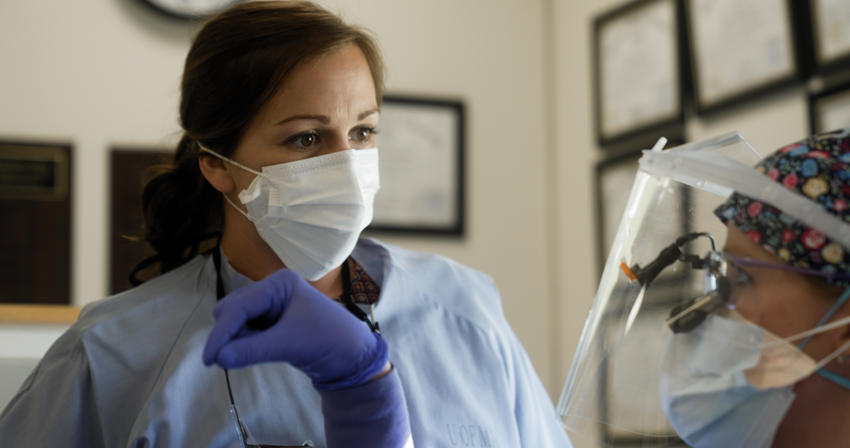Women's Dental Association hosts alumnae to share insights and inspiration

A joint event between the Women’s Dental Association and School of Dentistry Alumni Relations connected alumni and soon-to-be-graduates to discuss work, life and being a woman in dentistry.
On Tuesday, April 5, alumni Lisa Young, DDS ’98, and Sarah Heuer, DDS ’94, shared their career journeys and their perspectives on issues facing current graduates.
Young graduated with honors in 1998 and was awarded the Pierre Facuhard Award during her final year of dental school. The first woman to join the Board of the Minnesota Dental Association, she practiced in the Twin Cities for five years before returning to Madison, Wisconsin, where she owns her own practice today.
Heuer also graduated with honors, receiving the Mellor Holland award for academic and leadership experience. After graduation, she completed a one-year residency at Meriter Hospital in Madison, Wisconsin, focusing on treatment for medically complex patients. She was recognized for outstanding service and professionalism with the Wisconsin Dental Association Pyramids of Pride Community Outreach Award in 2001.
Approximately twenty students, mainly women, attended the panel discussion, moderated by fourth-year student Sophie Berkenpas, who asked questions submitted by students.
How did you navigate maternity leave conversations, both when seeking a job and later?
Heuer: Get to know your employer first. Understand their values, and make sure your values align with theirs. Much of the time, your contract will include language around maternity leave. In my experience, I told my employer as soon as I knew that I was pregnant, because I was having complications. If you and your colleagues have similar values, it doesn’t have to be a difficult conversation.
Young: Consider things like this if you want to own a practice, too–if you aren’t producing, you aren’t making money. Hygiene can keep production going to an extent, but it’s hard to keep things going without a doctor there.
When evaluating contracts, what are things to look out for, and what questions should we ask a potential employer?
Young: Ask questions like who pays the lab fees and if they offer continuing education support. Those are expensive, and you want to know if you’ll be expected to cover them. And find out what kinds of hygiene exams you’ll be allowed to do. In my first associateship, I wasn’t able to do exams when the other dentist was around, because the patients knew the other doctor. That’s how you get to know the patients, and that’s how you get them to work with you. So be sure you’re going to have the opportunity to get to know patients.
Heuer: Ask how new patients are distributed. If you are working under a dentist who just wants to hire an associate so they don’t have to do fillings, that might be a red flag. On the other hand, if you have a dentist who supports you in providing comprehensive care and growing as a provider, that’s great. Have conversations about how many patients you’ll get, what insurance they accept, and more. What it comes down to is values: get to know the people you’ll be working with, and see if their values align with yours. That’s the key to a good work relationship.
How do you navigate being a leader in your practice as a woman?
Young: this can be tricky because the female staff may see you as a friend. That can be challenging when you need to command respect. Finding your vision and sharing that vision as a leader helps everyone get behind and support you. Early in my career, I didn’t know what my vision was. I just wanted to be good at dentistry. But as you figure that out and communicate it to your staff, respect and teamwork will come with it. You’re working toward a common goal, and that makes a big difference.
Heuer: Boundaries are really important. You’re not there to be their friend, you’re their mentor. If you focus on their passion for patient care, they will see that and respect it.
How do you manage balancing work and life outside of school?
Young: A great thing about being a dentist is you have some control over your schedule. When my kids were young, I only saw patients three days per week. Make sure you factor in enough time for working in the lab, in addition to patient care, but that balance is important. It’s also important to have a good support group. When your patients are your priority, you will miss some things—so having a community around you is key.
Heuer: All along your career there are choices and paths you take. I always wanted a cool career, but I also wanted a family—so I had to find ways to make that work. I had to make choices to allow work-life balance to be optimal for what made sense to me. One of those things was getting my kids off the bus every day. That was important to me, so I made it work. You just have to figure out your priorities, and do what works for you.
Learn more about how you can stay connected with your alma mater as a gopher, for life.